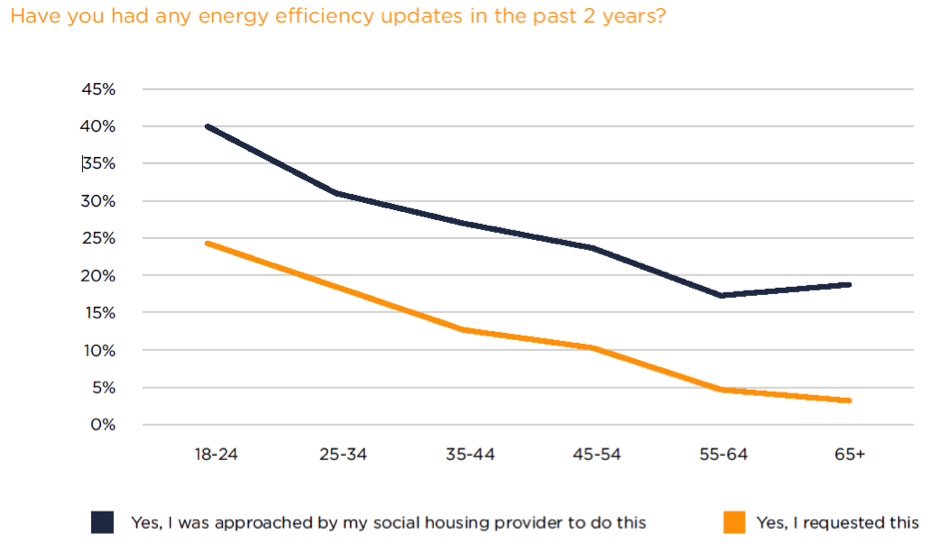Shakespeare Martineau Retrofit Report Launch
- All
- tenants
- landlords-and-investors
- designers-and-developers
- All Articles
- Letting Agents
- Landlords & Investors
- Designers & Developers
Back to Resources
Shakespeare Martineau Retrofit Report Launch
Tue Sep 19, 2023
New research shows the extent of the energy retrofit work required in social housing sector. AccessiblePRS contributed as Accessible and Energy Efficient need to come together in homes!

New research shows extent of retrofit work required in social housing sector
· Less than half of tenants report having energy-saving technology fitted in the past two years
· Mismatch in what energy-saving technology tenants want vs what they have been offered
· Concerns about the retrofit process raised vary depending on the age of the tenant
· Calls for a more joined up approach to funding retrofit programmes
New tenant opinion data collected by law firm Shakespeare Martineau, as part of its Retrofit: engaging the hearts and minds of tenants white paper, is thought to be the largest survey of its kind to garner the attitudes and opinions of tenants about retrofitting their homes.
As well as exposing the needs and concerns of tenants, the report also highlights the need for more joined up thinking in funding retrofit programmes as well as warning that, without a more holistic climate view, some of the most energy-efficient homes today, could be over-heating in the future.
Results show that less than half of tenants (46%) report having had any energy saving technology – from loft insulation, to new windows - installed in their homes in the past two years, despite 86% wanting to be more involved in the process of making their home more energy efficient.
According to the data, the younger the tenant is, the more likely they are to have had any retrofitting, likewise, younger tenants are also more likely to have requested the installation of energy saving technology, showing proactivity by tenants pays off.

Undertaking retrofit projects is a significant challenge for the social housing sector, which owns 4.4 million properties across the UK, many of which are classed as ageing housing stock.
Louise Drew, head of building communities at law firm Shakespeare Martineau and lead author of the report, said: “All homes - social housing or conventional - need to become more ‘green’, and given the tight deadline of 2050, it is concerning to see over half of social housing tenants not getting the improvements they need. However, this isn't down to unwillingness by RPs - they are as keen as their tenants to see the work done. This is down to a host of wider issues around how funding is accessed, the timescales allowed to utilise grant funding, the skills gap and the technology gap.”
The report also demonstrates a mismatch between what tenants want, versus what tenants are receiving. Data shows greatest demand for new doors and windows, solar panels and heating systems. However, tenants are more likely to report that they’ve received new heating systems and loft insulation, with solar panels the least likely to have been installed.
Louise continues: “The mismatch is likely due to tenants wanting technology and products that are ‘visual’ over fabric-first that’s ‘hidden’ in lofts and walls. We’re still a long way from ensuring the benefits of these ‘behind the scenes’ improvements are fully understood by tenants, a job for the sector as a whole.”
There are several concerns raised by tenants about the process, namely around timescales, hassle and communication, with those aged over 55 most likely to raise concerns about understanding the process, works and technology.

This lack of understanding is consistent with a lack of knowledge or information: on average 64% of people either don’t know or aren’t sure about the options available to them for having their home retrofitted. This figure jumps up significantly for people aged 55+ to 84%.
From the point of view of the sector, one of the greatest issues is funding, with experts calling for a more joined up approach.
Research shows that substandard housing is costing the NHS £1.4 billion a year, from slips, trips, falls as well as issues from drafts, damp and poor insulation.
Joanna Lee-Mills, head of social housing development at Shakespeare Martineau, said: “A good home creates savings elsewhere – and given the NHS is seeing immense pressure, why aren’t we connecting the dots?
“If we started recording what mattered, such as data that demonstrates the benefits high-quality homes have on health and wellbeing, including a consistency in temperature and accessibility, then the government could introduce pay-backs for providers who can demonstrate health improvements through housing, which can be reinvested back into the housing stock and community.”
Louise added: “Social housing providers and their tenants are often the test beds for the latest initiatives and technology. Funding and unrealistic timescales for delivering schemes through the grants that are provided remain a test, but providers are rising to the challenge.
“However, activity remains reactive. And without a carrot for housing providers, we won’t see change towards more proactivity. “
Contributors to the report included: AccessiblePRS, Agile Property & Homes, Longhurst, Orbit, Sanctuary, Seddon Construction Ltd, Southern Housing, Switchee, Tin Ventures, University of Sterling, Unlock Net Zero, whg, Yeoman & Owen Estate Agents.
